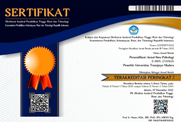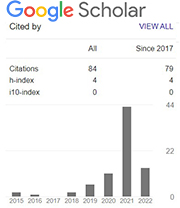Pengaruh Self-Acceptance Terhadap Academic Hardiness pada Mahasiswa Non-Muslim di Kampus Islam
Abstract
Keywords
Full Text:
PDF (Bahasa Indonesia)References
Afifi, S., Murtafi’ah, B., Sofia, N., & Nursita, R. D. (2021). Adab mahasiswa: Panduan Aaab mulia pencari ilmu. Spasi Book.
Angkat, A. S., & Indriana, Y. (2020). Hubungan penerimaan diri dengan adversity intelligence dalam menghadapi Ujian Nasional Berbasis Komputer (UNBK) pada siswa kelas XI SMA Mardisiswa Semarang. Jurnal EMPATI, 7(2), 785–789. https://doi.org/10.14710/empati.2018.21712
Benishek, L. A., Feldman, J. M., Shipon, R. W., Mecham, S. D., & Lopez, F. G. (2005). Development and evaluation of the revised academic hardiness scale. Journal of Career Assessment, 13(1), 59–76. https://doi.org/10.1177/1069072704270274
Benishek, L. A., & Lopez, F. G. (2001). Development and initial validation of a measure of academic hardiness. Journal of Career Assessment, 9(4), 333–352. https://doi.org/10.1177/106907270100900402
Berger, E. M. (1952a). The relation between expressed acceptance of self and expressed acceptance of others. Journal of Abnormal and Social Psychology, 47(4), 778–782. https://doi.org/10.1037/h0061311
Berger, E. M. (1952b). The relation between expressed acceptance of self and expressed acceptance of others. The Journal of Abnormal and Social Psychology, 47(4), 778–782. https://doi.org/10.1037/h0061311
Brooks, R., & Goldstein, S. (2009). Raising a self-disciplined child. McGraw-Hill Education.
Carson, S. H., & Langer, E. J. (2006). Mindfulness and self-acceptance. Journal of Rational-Emotive & Cognitive-Behavior Therapy, 24(1), 29–43. https://doi.org/10.1007/s10942-006-0022-5
Dweck, C. S., & Leggett, E. L. (1988). A social-cognitive approach to motivation and personality. Psychological Review, 95(2), 256–273. https://doi.org/10.1037/0033-295X.95.2.256
Ghozali, I. (2013). Aplikasi analisis multivariate dengan program SPSS (7th ed.). Badan Penerbit Universitas Diponegoro.
Grijalvo, M. O., Kalalo, T., Heng, P. H., Dewi, F. I. R., Angus, A., & Pesik, T. (2023). Social support, self-acceptance, and adversity quotient among residents of selected drug treatment and rehabilitation center. International Journal of Application on Social Science and Humanities, 1(1), 1221–1233. https://doi.org/10.24912/ijassh.v1i1.25797
Hair, J. F., Black, W. C., Babin, B. J., & Anderson, R. E. (2013). Multivariate data analysis (Seventh). Pearson Higher Education.
Hair Jr, J. F., Black, W. C., Babin, B. J., & Anderson, R. E. (2019). Multivariate data analysis (8th ed.). Annabel Ainscow.
Henseler, J., Ringle, C., & Sarstedt, M. (2015). A new criterion for assessing discriminant validity in variance-based structural equation modeling. Journal of the Academy of Marketing Science, 43(1), 115–135. https://doi.org/10.1007/s11747-014-0403-8
Hidayat, A., Arief, Y., Widiantoro, D., & Putri, A. (2024). The influence of patience and hardiness personality on homesickness behavior among out-of-town students: an Islamic psychology perspective. Psikis Jurnal Psikologi Islami, 10(1), 47–58.
https://doi.org/10.19109/psikis.v10i1.19711
Hidayat, A., Azhar, M., Purnomo, H., Nugroho, S., Napitupulu, L., & Yusdanis, I. (2024). Predictors of patience in Islamic psychology: An evidence from Indonesia. Islamic Guidance and Counseling Journal, 7(1), 1–23. https://doi.org/10.25217/0020247447400
Hidayat, A., Azhar, M., Purnomo, H., Reza, I. F., & Napitupulu, L. (2024). The influence of taqwa (piety) and amal saleh (good deeds) on patience among muslim students at an Islamic campus. International Journal of Islamic Thought and Humanities, 3(1), 89–105. https://doi.org/10.54298/ijith.v3i1.188
Hidayat, A., & Muliadi, R. (2022). Penyesuaian diri pada mahasiswa non-muslim di kampus Islam. Journal of Islamic and Contemporary Psychology (JICOP), 2(2), 81–91. https://doi.org/10.25299/jicop.v2i2.11151
Islam, D. N., & Hidayat, A. (2023). Kesabaran terhadap self acceptance pada mahasiswa Fakultas Psikologi Universitas Islam Riau. Psikobuletin:Buletin Ilmiah Psikologi, 4(3), 194. https://doi.org/10.24014/pib.v4i3.23822
Kline, R. (2015). Principles and practice of structural equation modeling. Guilford publications.
Kobasa, S. C., Maddi, S. R., & Kahn, S. (1982). Hardiness and health: A prospective study. Journal of Personality and Social Psychology, 42(1), 168–177. https://doi.org/10.1037/0022-3514.42.1.168
Kristianti, A. P., & Kristinawati, W. (2024). Hubungan antara penerimaan diri dengan resiliensi pada remaja di Panti Asuhan. Wacana Psikokultural, 2(1), 40–48. https://doi.org/10.24246/jwp.v2i1.9987
Lestari, S. P. (2013). Hubungan antara kepribadian tahan banting dengan penerimaan diri pada difabel akibat gempa Yogyakarta. Empathy: Jurnal Fakultas Psikologi, 2, 857–870.
Maddi, S. R., Matthews, M. D., Kelly, D. R., Villarreal, B. J., Gundersen, K. K., & Savino, S. C. (2017). The continuing role of hardiness and grit on performance and retention in West Point Cadets. Military Psychology, 29(5), 355–358. https://doi.org/10.1037/mil0000145
Maladi, O. S. (2022). Hubungan antara kepribadian hardinnes dengan self accepptance pada penderita gagal ginjal di Solo Raya [Tesis]. Universitas Islam Indonesia.
https://dspace.uii.ac.id/handle/123456789/38199
Noorlatifah, E. (2021). Hubungan antara penerimaan diri dengan academic hardiness pada mahasiswa tingkat akhir yang sedang menyelesaikan Skripsi di Program Studi Psikologi Fakultas Kedokteran ULM [Tesis]. Universitas Lambung Mangkurat.
https://digilib.ulm.ac.id/archive/digital/detailed.php?code=17618
Putri, A., & Hidayat, A. (2023). The Effect of Patience On Academic Hardiness in Overseas Students at The Faculty of Psychology, Universitas Islam Riau. International Journal of Education, Psychology and Counseling, 8(52), 492–509. https://doi.org/10.35631/IJEPC.852038
Sarwono, J., & Narimawati, U. (2015). Membuat skripsi, tesis, dan disertasi dengan partial least square SEM (PLS-SEM) (A. Prabawati, Ed.). Andi.
Suryani, Y. E., & Uningowati, D. W. (2020). Measuring the resilience of Indonesian communities to disaster. Social, Humanities, and Educational Studies (SHEs): Conference Series, 3(1), 277–284. https://doi.org/10.20961/shes.v3i1.45065
Wardani, R. (2020). Academic hardiness, skills, and psychological well-being on new student. Jurnal Psikologi, 19(2), 188–200. https://doi.org/10.14710/jp.19.2.188-200
Widiastuti, D., & Indriana, Y. (2020). Hubungan antara konsep diri dengan hardiness pada mahasiswa yang mengerjakan skripsi di Fakultas Psikologi Universitas Diponegoro. Jurnal EMPATI, 7(1), 332–338. https://doi.org/10.14710/empati.2018.20245
Zuhdi, Z., Suharjo, B., & Sumarno, H. (2016). Perbandingan pendugaan parameter koefisien struktur model melalui SEM dan PLS-SEM. Journal of Mathematics and Its Applications, 15(2), 11–22. https://doi.org/10.29244/jmap.15.2.11-22
DOI: https://doi.org/10.21107/personifikasi.v15i2.23422
Refbacks
- There are currently no refbacks.
Copyright (c) 2024 ahmad hidayat

This work is licensed under a Creative Commons Attribution 4.0 International License.


Personifikasi by Universitas Trunojoyo Madura is licensed under a Creative Commons Attribution 4.0 International License.










